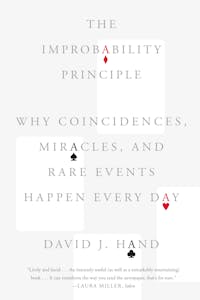The Improbability Principle
Why Coincidences, Miracles, and Rare Events Happen Every Day
 Download image
Download image
ISBN10: 0374535000
ISBN13: 9780374535001
Trade Paperback
288 Pages
$18.00
CA$24.50
In The Improbability Principle, the renowned statistician David J. Hand argues that extraordinarily rare events are anything but. In fact, they're commonplace. Not only that, we should all expect to experience a miracle roughly once every month.
But Hand is no believer in superstitions, prophecies, or the paranormal. His definition of "miracle" is thoroughly rational. No mystical or supernatural explanation is necessary to understand why someone is lucky enough to win the lottery twice, or is destined to be hit by lightning three times and still survive. All we need, Hand argues, is a firm grounding in a powerful set of laws: the laws of inevitability, of truly large numbers, of selection, of the probability lever, and of near enough.
Together, these constitute Hand's groundbreaking Improbability Principle. And together, they explain why we should not be so surprised to bump into a friend in a foreign country, or to come across the same unfamiliar word four times in one day. Hand wrestles with seemingly less explicable questions as well: what the Bible and Shakespeare have in common, why financial crashes are par for the course, and why lightning does strike the same place (and the same person) twice. Along the way, he teaches us how to use the Improbability Principle in our own lives—including how to cash in at a casino and how to recognize when a medicine is truly effective.
An irresistible adventure into the laws behind "chance" moments and a trusty guide for understanding the world and universe we live in, The Improbability Principle will transform how you think about serendipity and luck, whether it's in the world of business and finance or you're merely sitting in your backyard, tossing a ball into the air and wondering where it will land.
Reviews
Praise for The Improbability Principle
"Very engaging . . . If you wish to read about how probability theory can help us understand the apparent hot hand in a basketball game, superstitions in gambling and sports, prophecies, parapsychology and the paranormal, holes in one, multiple lottery winners, and much more, this is a book you will enjoy. I will go further. The statistician Samuel S. Wilks (paraphrasing H.G. Wells) said that ‘statistical thinking will one day be as necessary for efficient citizenship as the ability to read and write.' With that laudable goal in mind, The Improbability Principle should be, in all probability, required reading for us all."—John A. Adams, The Washington Post
"[An] ingenious introduction to probability that mixes counterintuitive anecdotes with easily digestible doses of statistics . . . Hand offers much food for thought, and readers willing to handle some simple mathematics will find this a delightful addition to the 'why people believe weird things' genre."—Publishers Weekly
"Lively and lucid . . . an intensely useful (as well as a remarkably entertaining) book . . . It can transform the way you read the newspaper, that's for sure."—Salon
"[Hand] leads readers through this unfamiliar land of probability and statistics with whit and charm, all the while explaining in layman's terms the laws that govern it . . . We predict there's a very good chance you'll enjoy this book"—Success
"Enlightening and entertaining . . . an erudite but utterly unpretentious guide . . . ably and assuredly demystifies an ordinarily intimidating subject"—Kirkus
"In my experience, it is very rare to find a book that is both erudite and entertaining. Yet The Improbability Principle is such a book. Surely this cannot be due to chance alone!"—Hal R. Varian, chief economist at Google and professor emeritus at the University of California, Berkeley
"Considering that The Improbability Principle comes from the keyboard of David J. Hand, it was perhaps inevitable that it would be a certain winner!"—John Pullinger, president of the Royal Statistical Society
"Written by one of the world's preeminent statisticians, The Improbability Principle provides you with a sense of what chance and improbability really mean, and engenders an understanding that uncertainty rests at the core of nature. I highly recommend this book."—Joseph M. Hilbe , president of the International Astrostatistics Association and ambassador for the NASA/Jet Propulsion Laboratory at the California Institute of Technology
"As someone who happened to meet his future wife on a plane, on an airline he rarely flew, I wholeheartedly endorse David J. Hand's fascinating guide to improbability, a subject that affects the lives of us all, yet until now has lacked a coherent exposition of its underlying principles."—Gordon Woo, catastrophist at Risk Management Solutions and author of Calculating Catastrophe
"The Improbability Principle is an elegant, astoundingly clear, and enjoyable combination of subtle statistical thinking and real-world events. David J. Hand really does explain why ‘surprising' things will happen and why statistics matters."—Andrew Dilnot, coauthor of The Numbers Game: The Commonsense Guide to Understanding Numbers in the News, in Politics, and in Life
Reviews from Goodreads
BOOK EXCERPTS
Read an Excerpt
1
THE MYSTERY
Fortune brings in some boats that are not steer'd.
—William Shakespeare
Simply Unbelievable
In the summer of 1972, the actor Anthony Hopkins was signed to play a leading...



